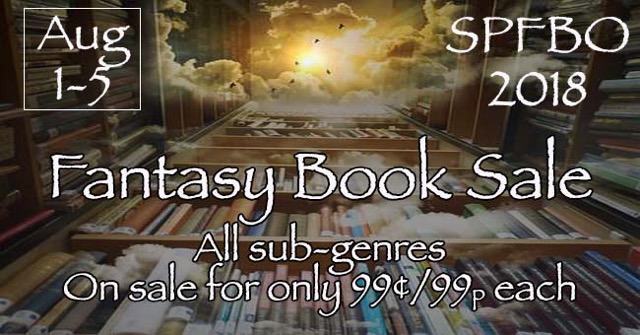Michael Baker, a fellow author over at The Thousand Scars, has been posting SPFBO author interviews, and today is my turn! Check it out here:
Big self-published book promo for SPFBO

Starting tomorrow, to kick-off SPFBO, August 1st, over a hundred of the books (including mine) entered into 2018’s Self-Published Fantasy Blog Off will be available as ebooks for 99c/99p each.
View the entire list here: http://www.andreadomanski.com/spfbo
This is a fantastic opportunity to pick up some great self-published fantasy and see what’s out there! All sub-genres, so if you like fantasy at all, there’s gotta be something that’ll interest you.
SPFBO 2018
The 2018 Self-Published Fantasy Blog Off is about to kick off. 300 self-published books, 10 reviewing blogs, 10 finalists, and one winner. It’s organized by author Mark Lawrence, and you can read more about it here:
http://mark—lawrence.blogspot.com/2018/06/the-official-self-published-fantasy.html
My book The Hidden Ones is one of the 300 entries, which is fun and a bit exciting. The way the contest is structured, each blog picks one finalist, so as of the end of phase one (Aug 1 – Dec 31) a whopping 290 books will be eliminated. If I get picked as a finalist, that would be awesome, if not, well, I’m in good company.
I’ve also added the previous winners and finalists to my eternal list of to-be-read books. I’ve already managed to read last year’s winner, Where Loyalties Lie, by Rob J. Hayes, and I’ve read two of the other books in this year’s SPFBO, Richard Nell’s Kings of Paradise, and M.L. Spencer’s Darkmage.
It’s great to see quality books being self-published. The stigma against self-publishing has significantly faded, but there are still the very real problems of sheer quantity and discoverability. SO many books are published, but how to find the good ones? Well, one way is to pay attention to the SPFBO and read the upcoming reviews.
If you’ve never given self-published books a shot, try one (hey, maybe mine). There are many talented authors now deliberately choosing self-publishing, and many choosing trade publishing or going hybrid and doing some of both.
It’s an exciting world, innit?
Writing book #2: things I wish I had done the first time around
With book 1 of my series done and published, I am finally able to turn my full attention to book 2.
I have plenty of notes and ideas and snippets, and work is progressing, but not smoothly, because I never did a couple things during the writing of book 1 that I now wish I had.
Specifically, a master timeline, and a master character list.
I know where all the main characters are, of course, and all the side characters who were with them, but the other side characters, the ones who showed up earlier in the book and then were left behind… those guys all disappeared into the writing ether. I never bothered to establish what happened to any of them, and now it matters, given the events of book 1.
So I spent a day going through my own published book and creating not only a master character list, but also an associated timeline, so that I know where everyone is, what happened to them, and when. It was a pain, but at the same time, kinda pleasant. It hurts good, to quote–I dunno, maybe Family Circus?–something I remember from many years ago.
So that’s done. (Hold on while I make a backup copy, just, y’know, in case)
Turns out I created well over a hundred characters for this book. I suppose that’s pretty normal, or maybe on the low side for epic fantasy. Most of them are just a name accompanied by scant detail. Gender, general age, maybe a relationship with another barely-there character.
It makes me wonder, though, if I should be doing more. Perhaps I could infuse more life into my books by going an extra level deeper even on minor characters. I don’t need to know the backstory of the door guard who the heroes encounter exactly once, but knowing even a tiny bit about him could inject a little character into his one line of dialogue.
I don’t mind making things up on the spot. It is, after all, a core part of the fiction writer job description, but I do need to keep better track of it all.
Typesetting for print: mistakes were made
In Typesetting for print copies, I went over my process of preparing my manuscript for paperback copies. I finished, uploaded the PDF file and cover to Createspace, then ordered a proof copy to see how it looks. Createspace strongly recommends you do this, and I learned why. Continue reading “Typesetting for print: mistakes were made”
Ideas
Something about a writer’s brain not only likes to imagine things, but it takes that next step and says, “write this!” We ignore it for so long, telling ourselves that our ideas are ridiculous. Nobody would want to read that. Then we read books where things happen (which may or may not be ridiculous) and, at some point, our brains whisper, “You can do this, too.” Continue reading “Ideas”
Typesetting for print copies
After finishing the e-book and cover and uploading them to Amazon, the next step was to prepare the manuscript for print copies. In my case, for Createspace or KDP, but there are other print-on-demand services out there, such as IngramSpark. Continue reading “Typesetting for print copies”
Post-finishing #2: Sigil
In Post-Finishing #1, I mentioned that I used Sigil to take the finished manuscript from Scrivener and turn it into a good looking, functional e-book. Here’s what I did. Continue reading “Post-finishing #2: Sigil”
Writing a novel in Scrivener
I used Scrivener 1.9.7 for Windows to write my novel. I am not affiliated in any way with Scrivener or its developer, nor am I receiving any compensation for this.
There are many programs and apps for writing, everything from Word and its equivalents to more specialized writing tools, some online, some offline, like Scrivener.
I originally wrote in Word, because a) it’s what I had on my computer, and b) I’ve used it extensively, both in school and in corporate America. Continue reading “Writing a novel in Scrivener”
Post-finishing #1
This isn’t about querying, or running ad campaigns, or that sort of thing. This is about the nuts-and-bolts part of finishing a book, and finishing the finishing. The bent here is on self-publishing. Continue reading “Post-finishing #1”
